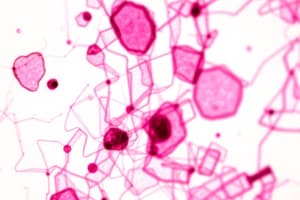Podcast
Questions and Answers
What factor significantly affects the results of an assay due to nonspecific adsorption?
What factor significantly affects the results of an assay due to nonspecific adsorption?
- The concentration of the bioreagents used
- The design of the assay layers
- The type of analyte being tested
- The membrane's non-specific adsorption properties (correct)
Which role does the adsorbent pad play in an immunochromatography strip?
Which role does the adsorbent pad play in an immunochromatography strip?
- It retains the liquid and controls the flow rate (correct)
- It blocks nonspecific adsorption on the membrane
- It serves as the primary detector of analyte
- It enhances the color intensity of the test result
How does the backing card contribute to the immunochromatography strip?
How does the backing card contribute to the immunochromatography strip?
- It enhances the sensitivity of the test
- It interacts chemically with the sample
- It supports the assembly of the components (correct)
- It serves as a diagnostic indicator
What is the significance of using a high-sensitivity reader in immunochromatography?
What is the significance of using a high-sensitivity reader in immunochromatography?
What does the intensity of the colored line in an immunochromatography test indicate?
What does the intensity of the colored line in an immunochromatography test indicate?
What is the primary function of the sample application pad in immunochromatography?
What is the primary function of the sample application pad in immunochromatography?
In which part of the immunochromatography test is the labeled biorecognition molecule released?
In which part of the immunochromatography test is the labeled biorecognition molecule released?
What is a critical feature of the substrate membrane in immunochromatography?
What is a critical feature of the substrate membrane in immunochromatography?
How long does it typically take to obtain results from an immunochromatography test?
How long does it typically take to obtain results from an immunochromatography test?
What materials are commonly used to make the conjugate pad in immunochromatography?
What materials are commonly used to make the conjugate pad in immunochromatography?
What happens when the antigen and antibody combine in immunochromatography?
What happens when the antigen and antibody combine in immunochromatography?
What factor can significantly affect the sensitivity of an immunochromatography assay?
What factor can significantly affect the sensitivity of an immunochromatography assay?
Which of the following statements about immunochromatography is incorrect?
Which of the following statements about immunochromatography is incorrect?
Flashcards
Immunochromatography (ICA)
Immunochromatography (ICA)
A rapid diagnostic testing method used to detect analytes (like diseases) in a sample, producing results in minutes. The sample is applied to a test strip containing antibodies and the presence of the analyte is indicated by a color change.
Sample Application Pad
Sample Application Pad
The pad where the sample (e.g., urine) is initially placed on the test strip to start the assay.
Conjugate Pad
Conjugate Pad
The pad where labeled biorecognition molecules (e.g., gold-labeled antibodies) are added to create a visible reaction.
Substrate Membrane
Substrate Membrane
Signup and view all the flashcards
Analyte Detection
Analyte Detection
Signup and view all the flashcards
Color Band Formation
Color Band Formation
Signup and view all the flashcards
Near-patient testing
Near-patient testing
Signup and view all the flashcards
Sensitivity of ICA
Sensitivity of ICA
Signup and view all the flashcards
Nonspecific Adsorption
Nonspecific Adsorption
Signup and view all the flashcards
Adsorbent Pad Function
Adsorbent Pad Function
Signup and view all the flashcards
Immunochromatography Test Result
Immunochromatography Test Result
Signup and view all the flashcards
Backing Card Material
Backing Card Material
Signup and view all the flashcards
Assay Sensitivity
Assay Sensitivity
Signup and view all the flashcards
Study Notes
Immunochromatography
- A rapid diagnostic method used to detect diseases
- Drops a sample containing an analyte onto a test strip
- Results in 10-15 minutes
- Primarily used in research labs
- Also used in near-patient testing with commercially available "sticks"
- Sample (e.g., urine) is applied to the stick
- Capillary action develops the test
- Analyte of interest binds to antibodies at a specific zone
- Antigen and antibody combination creates a visible colored spot/band
- Confirms the presence of the compound of interest
Components of Immunochromatography Strips
- Sample Application Pad: Made of cellulose/glass fiber, transports sample smoothly to other components
- Conjugate Pad: Holds labeled biorecognition molecules (e.g., antibodies, gold particles)
- Nitrocellulose Membrane: Supports the test and control lines; crucial for sensitivity
- Adsorbent Pad: Works as a sink, maintaining flow and preventing backflow of sample
Factors Affecting Sensitivity
- Substrate (Nitrocellulose Membrane): Crucial in sensitivity; ideal membrane provides good support and binding with antibodies/probes; less non-specific adsorption is better
- Preparation of Labeled Conjugate: Poor preparation negatively affects sensitivity and accuracy
- Drying and Blocking: Proper dispensing of bioreagents, drying, and blocking processes enhance sensitivity of assay
Result Interpretation
- Positive result is indicated by a colored line
- High-sensitivity readers can detect even very faint lines
- Intensity of the colored line is proportional to the analyte amount in the sample
- Lowers the burden on the patient by using a small sample for testing
- Visual judgment or reader-based assessment determines positive/negative results
Studying That Suits You
Use AI to generate personalized quizzes and flashcards to suit your learning preferences.



